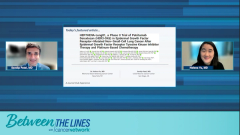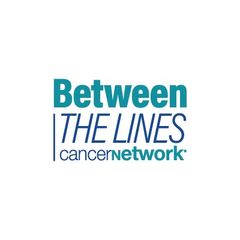
Targeting HER3 to Overcome Resistance in EGFR-mutated NSCLC: Patritumab Deruxtecan
Dr. Patel and Dr. Yu review the rationale for targeting HER3 as a novel approach to address acquired resistance in EGFR-mutant NSCLC.
Episodes in this series

This is a synopsis of an Insights series featuring Helena Yu, MD, of Memorial Sloan Kettering Cancer Center, and Sandip Patel, MD, of UCSD Moores Cancer Center.
The discussants noted promising data for the antibody-drug conjugate (ADC) amivantamab after osimertinib and chemotherapy in EGFR-mutant non-small cell lung cancer (NSCLC). However, effective treatments remain lacking after progression on amivantamab as well, with options limited to single agent chemotherapies like docetaxel.
Dr. Patel expressed excitement about targeting HER3 given the biology showing ERBB family signaling promotes NSCLC growth and resistance. Though HER3 expression level does not clearly predict ADC efficacy, nearly all EGFR-mutant NSCLCs overexpress HER3, which portends worse prognosis. HER3 pathway activation sustains signaling when EGFR is inhibited, suggesting dual EGFR/HER3 blockade could overcome resistance.
The components of ADCs include the antibody for homing to target cells, the linker chemically conjugating drug to antibody, and the cytotoxic payload too potent for systemic therapy alone. For the HER3 ADC patritumab deruxtecan (HER3-DXd), the antibody binds HER3 and the chemotherapy payload is a potent topoisomerase inhibitor, deruxtecan. Payload resistance can occur via efflux pumping chemotherapy out of cancer cells.
Dr. Yu noted the deruxtecan payload is also used in the HER2-targeting ADC trastuzumab deruxtecan and the TROP2 ADC datopotamab deruxtecan, raising questions around sequencing ADCs with shared payloads. A higher drug-to-antibody ratio (DAR) indicates more chemotherapy per antibody, typically conferring greater potency. ADCs can also exhibit bystander killing of neighboring tumor cells via payload diffusion.
The discussants transitioned to discussing the phase 2 HERTHENA-Lung01 trial of HER3-DXd in EGFR-mutant NSCLC progressing after osimertinib and platinum chemotherapy. Early data shows promising antitumor activity for HER3-DXd in this population. The objective response rate was 44% by investigator review and 37% per blinded independent central review, comparing favorably to historical chemotherapy response rates around 15% in this setting. Responses were durable, with median duration not reached after median 8 months follow-up. The safety profile included low rates of severe neutropenia and interstitial lung disease. Based on these results, studies are being planned to confirm HER3-DXd efficacy and expand evaluation into earlier EGFR TKI therapy lines for NSCLC.
*Video synopsis is AI-generated and reviewed by Cancer Network editorial staff.
Newsletter
Stay up to date on recent advances in the multidisciplinary approach to cancer.






































